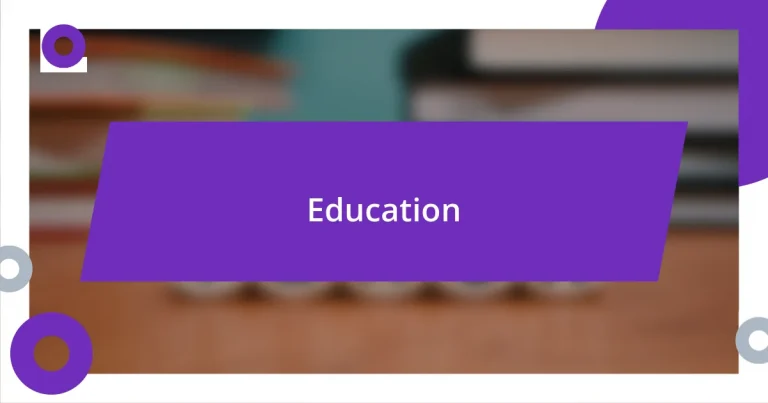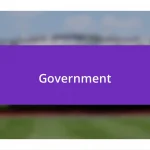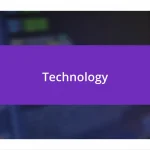Key takeaways:
- Online learning tools offer flexibility, accessibility to diverse resources, and foster a sense of community through forums and discussions.
- Choosing the right online learning tools is essential; factors like user interface, content variety, community engagement, and customization significantly impact effectiveness.
- Key strategies for enhanced learning include mixing content formats, using spaced repetition for retention, and engaging in reflective practice to deepen understanding.
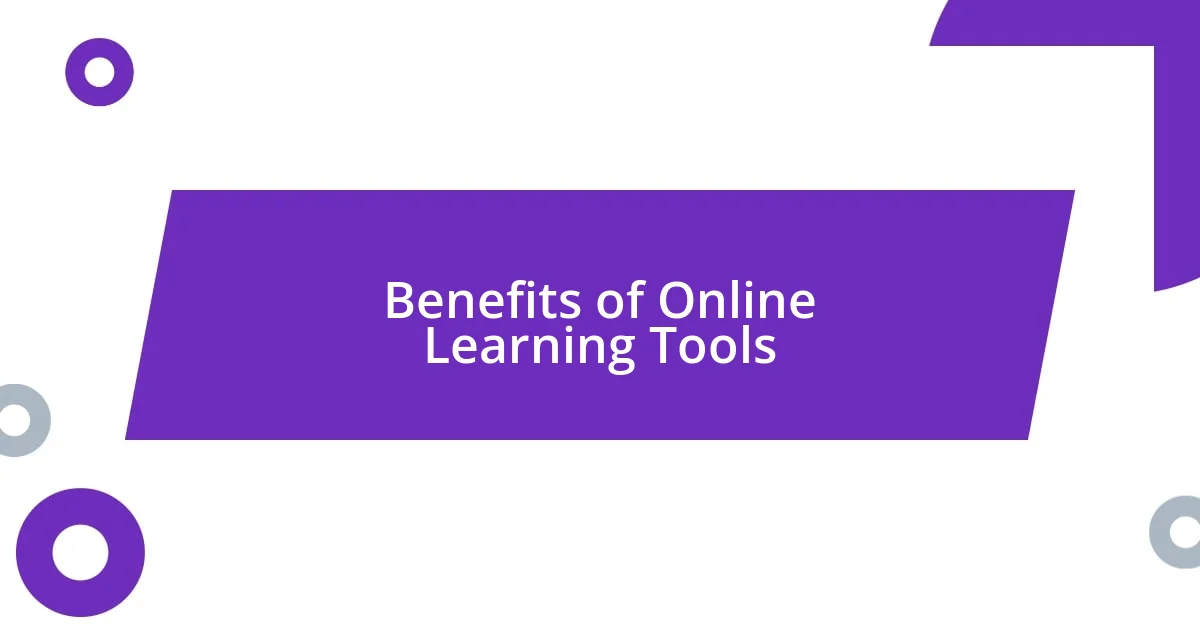
Benefits of Online Learning Tools
One of the most striking benefits of online learning tools is the flexibility they offer. I remember a time when I was juggling work and a personal project, and the ability to choose when and where I studied made all the difference. Have you ever found yourself needing a quick break while studying? Online tools allow that seamless transition, letting me absorb material whenever inspiration strikes.
Moreover, the accessibility of diverse resources has transformed my learning experience. I recall stumbling upon a video lecture that clarified a complex concept for me in just a few minutes—something textbooks often failed to do. Isn’t it freeing to know that if I struggle with one method, countless others are just a click away?
Additionally, online learning fosters a sense of community that might surprise you. Joining forums and discussions has connected me to people who share my interests, enabling exchanges that enrich my understanding. Have you ever shared a breakthrough idea with someone online? It’s moments like these that remind me how powerful collaborative learning can be in our journey together.
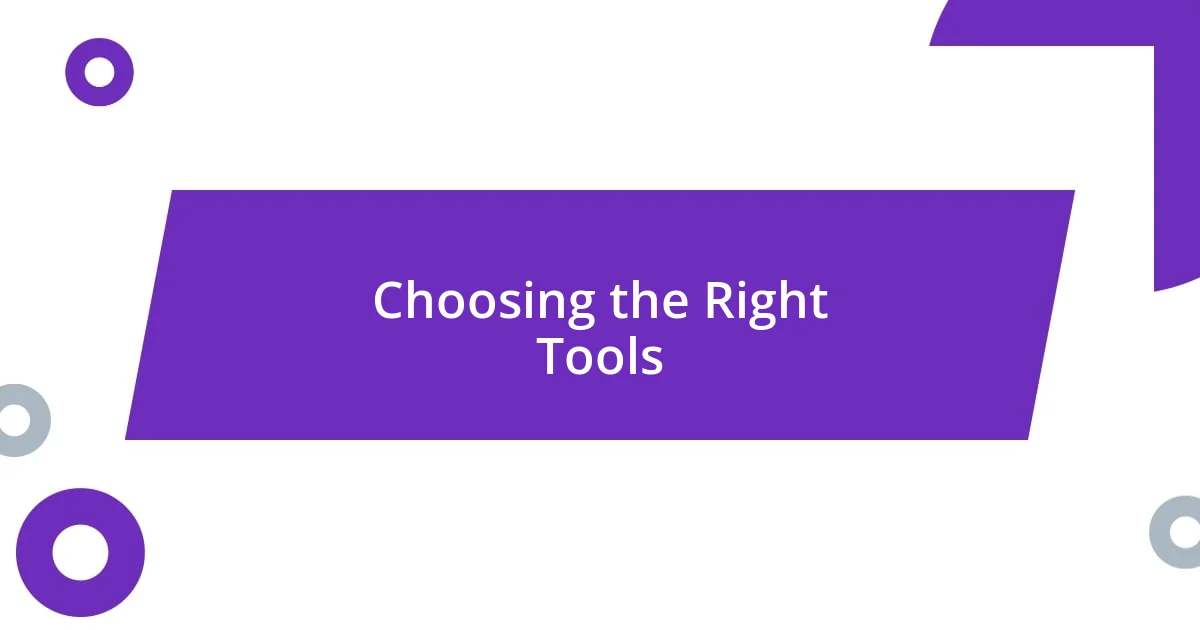
Choosing the Right Tools
Choosing the right tools can truly enhance your learning process. I’ve tried various platforms, and there’s definitely a distinction between merely useful and extraordinarily effective. I remember trying a flashcard app that just didn’t resonate with my learning style; the interface was confusing, and I lost motivation quickly. In contrast, when I discovered a tool that matched my visual learning preferences, everything clicked. It’s essential to assess what works for you personally before diving in.
When evaluating online learning tools, consider the following criteria to find what suits your needs best:
- User Interface: Is it easy to navigate? A cluttered design can hinder your focus.
- Content Variety: Does the platform offer multiple formats (videos, quizzes, articles)? I find variety keeps me more engaged.
- Community Engagement: Are there forums or study groups available? Sharing experiences with others can amplify learning.
- Customization: Can you tailor the tool to reflect your learning preferences? Personalization makes a big difference in retention.
- Reviews and Testimonials: What do other users say? I often rely on community feedback to gauge effectiveness.
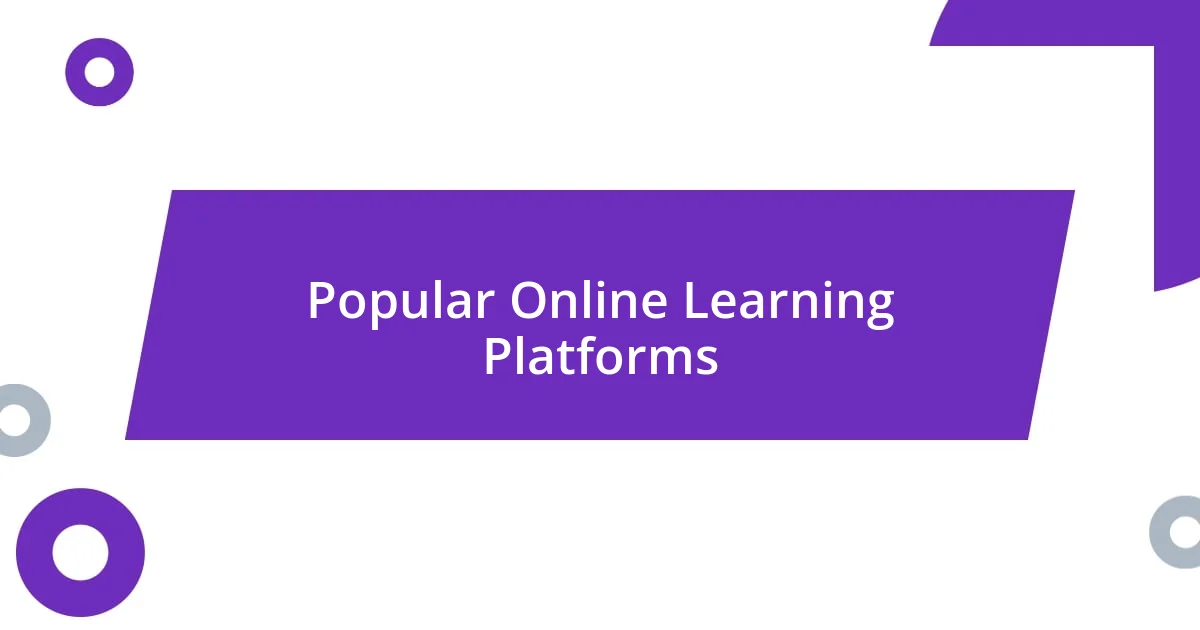
Popular Online Learning Platforms
Online learning platforms have become essential for many of us, and each offers unique strengths that cater to different learning preferences. For instance, I’ve found platforms like Coursera and Udemy to be especially helpful due to the variety of courses available, ranging from technical skills to creative arts. When I wanted to learn graphic design, the hands-on projects and feedback from instructors made the experience far more engaging than traditional classrooms ever did. Having access to experts from various fields has truly enriched my learning journey.
Khan Academy stands out for its structured approach. I recall when I was trying to grasp calculus concepts; the platform’s step-by-step videos helped clarify the principles effectively. Moreover, the progress tracking feature enabled me to measure my growth and stay motivated. This sense of structure is something I deeply appreciate, especially when tackling challenging subjects.
Then there’s the collaborative aspect found in platforms like edX, where participating in online discussions feels remarkably like being in a physical classroom. I remember exchanging insights on a political science course with students from around the world. It opened my eyes to different perspectives, allowing me to appreciate the value of global collaboration in learning. Being part of such a vibrant community not only enhanced my understanding but also made learning feel like a shared adventure.
| Platform | Key Features |
|---|---|
| Coursera | A wide range of courses, hands-on projects, and expert instructors. |
| Khan Academy | Structured learning paths, video tutorials, and progress tracking. |
| edX | Collaborative discussions, global community of learners, and diverse topics. |
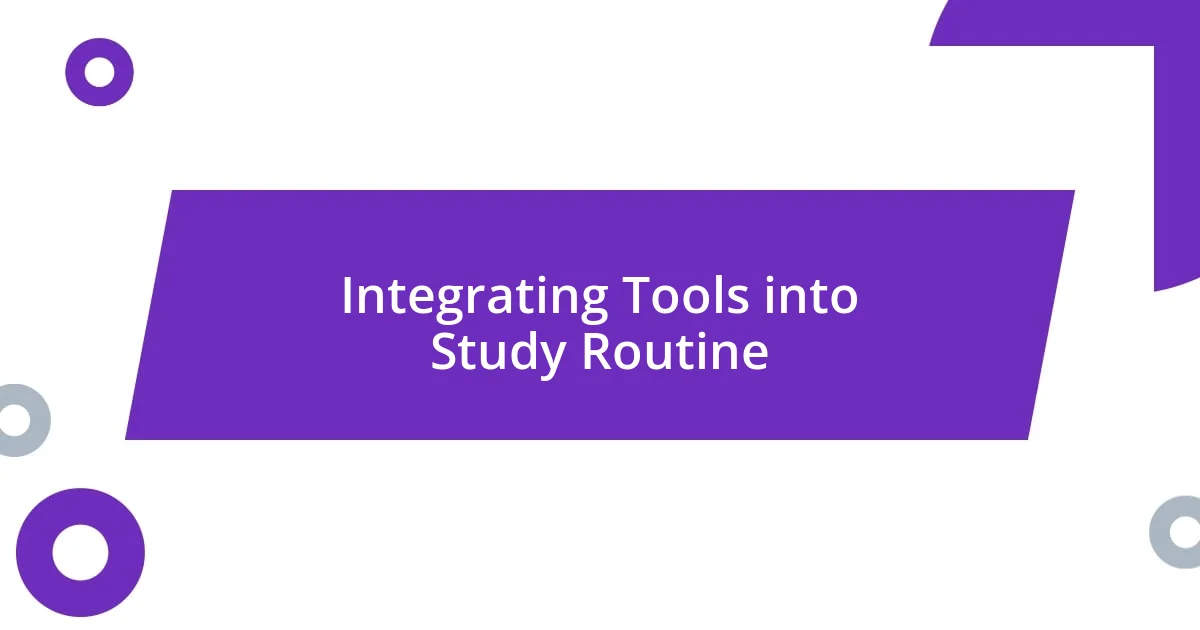
Integrating Tools into Study Routine
Integrating online tools into my study routine has been transformative for me. I love creating a structured schedule that incorporates various tools for different study sessions. For instance, on days when I’m tackling complex subjects, I often use interactive platforms like Quizlet to reinforce my understanding through engaging quizzes. Doesn’t the idea of turning study time into a game sound appealing?
I’ve found that setting specific goals for each tool really enhances my focus. When I decide to use a video-based platform like YouTube, I might watch a few tutorials while taking notes, then switch to a discussion forum to engage in deeper conversations about the material. This mix keeps my brain active and prevents boredom. I remember the excitement of diving deep into a topic, especially when I’d discover new insights during discussions—it’s like piecing together a puzzle!
Adapting my study routine to include these tools hasn’t just been about efficiency; it’s also about having fun. I often set aside time for brainstorming with a mind mapping tool, which sparks my creativity. This not only helps in organizing my thoughts but also boosts my enthusiasm for the project. Seeing my ideas visually laid out is thrilling! Have you ever tried this kind of approach? It might just change your entire study experience.
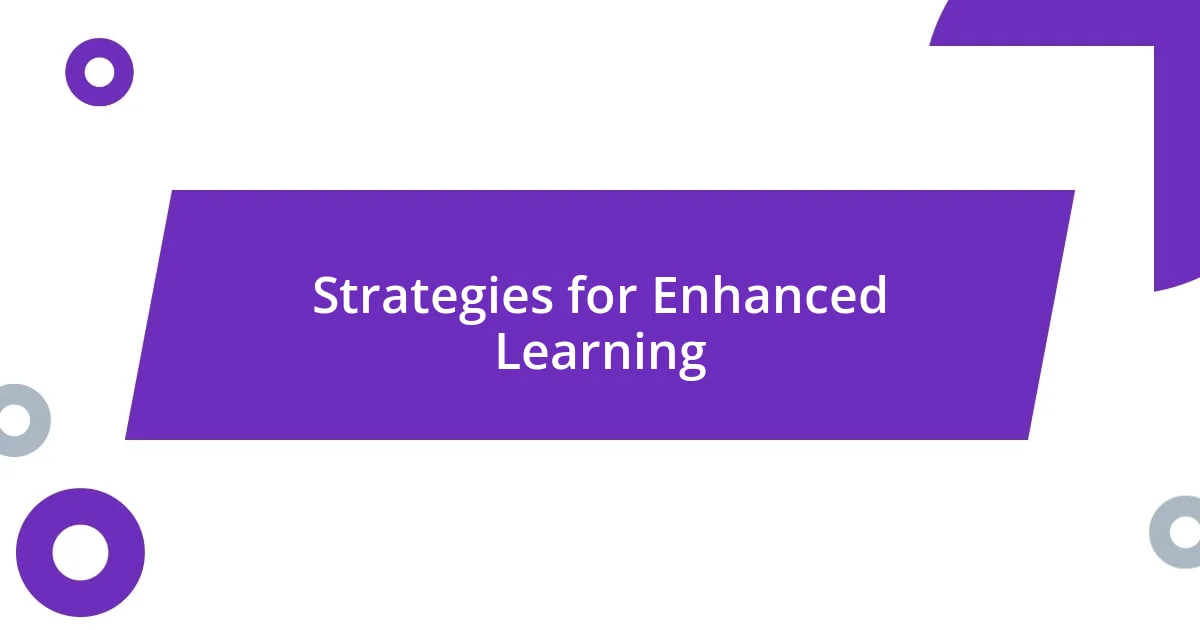
Strategies for Enhanced Learning
Finding effective strategies for enhanced learning has been a game changer for me. I’ve discovered that mixing different formats, like podcasts and articles, can keep my learning dynamic. Recently, when delving into psychology, I would alternate between listening to insightful podcasts during my commute and reading relevant articles at home. This blend not only solidified my understanding but also sparked my curiosity even further. Have you ever noticed how switching up your mediums can reignite your interest in a topic?
Another strategy that works wonders is the use of spaced repetition. I often utilize platforms like Anki to create flashcards for subjects I find tricky. The thrill of seeing those cards popping up just when I’m about to forget something is surprisingly motivating. I recall a time when I was preparing for an exam, and the targeted reminders helped cement the information in my mind more effectively than cramming ever could. Isn’t it incredible how the right timing can make such a significant difference in our retention of information?
Lastly, I’ve learned the importance of reflective practice. After completing a course or module, I take a moment to jot down my key takeaways and how I might apply them in real life. This small act of reflection always feels rewarding; it forces me to reconnect with what I’ve learned on a deeper level. Just the other day, after finishing a module on effective communication, I realized how I could implement those skills in my daily interactions. Reflection has a way of transforming mere knowledge into tangible wisdom, don’t you think?
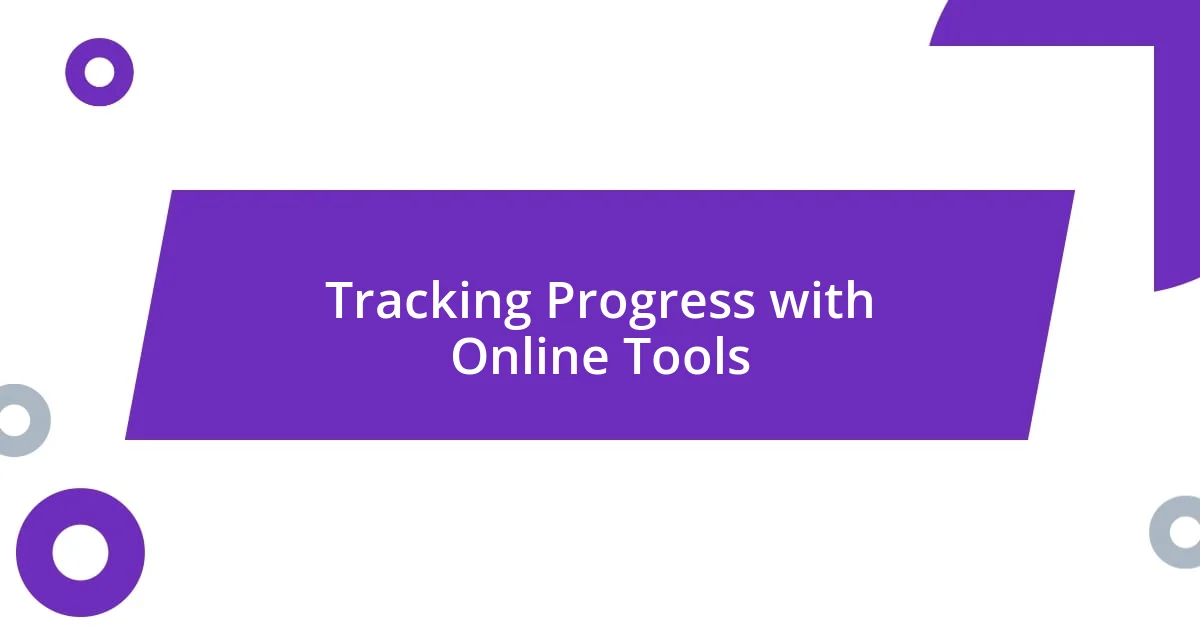
Tracking Progress with Online Tools
I’ve found that tracking progress is one of the crucial elements of successful online learning. Using apps like Trello to list my goals and breaking them into smaller tasks gives me a sense of accomplishment with each checkmark I make. It’s almost like a little celebration every time I finish a task! Have you ever noticed how those small wins can motivate you to tackle the next big challenge?
To ensure I’m truly understanding the material, I often use Google Sheets to monitor my learning milestones. For example, I created a simple spreadsheet for a recent coding course, marking off each module as I completed it along with my self-assessment scores. Seeing my progression laid out visually not only keeps me accountable but also highlights areas where I might need additional practice. It’s rewarding to track my journey and witness how much I’ve improved over time—doesn’t seeing your growth like that inspire you to push further?
Reflecting on my learning journey, I’ve embraced journaling as a technique to track my thoughts and progress. After completing a module, I take a few moments to write about what I understood, where I struggled, and how I can apply new knowledge. This reflective practice has deepened my learning and made it feel more personal. Recently, after a series of challenging lectures on economics, I realized how much I connected those concepts to real-world scenarios, which felt incredibly empowering. Isn’t it fascinating how adding a bit of reflection can transform our learning experience?
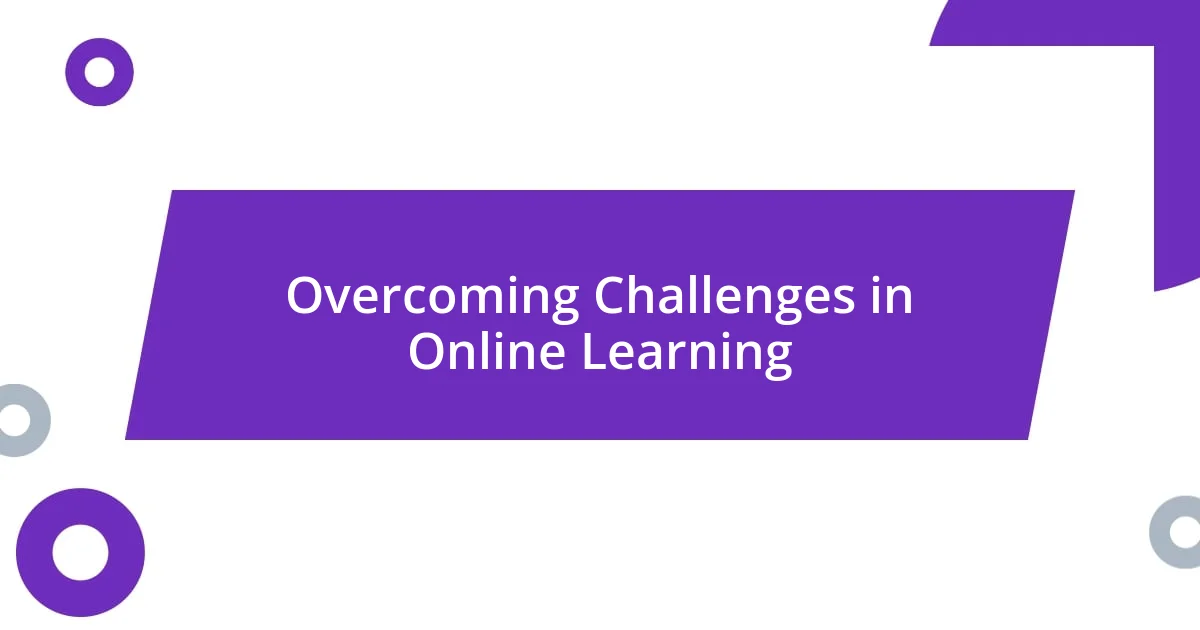
Overcoming Challenges in Online Learning
Online learning can often feel isolating, and it’s a challenge I’ve faced myself. I vividly remember a time when I signed up for a massive open online course (MOOC) and quickly found myself overwhelmed. The lack of in-person interaction made it tough to stay motivated, so I started forming a study group with fellow participants. We met virtually to discuss our progress and share insights, turning what felt like a solitary journey into a collaborative experience. Have you ever tried connecting with others online to enhance your learning?
One of the biggest hurdles I encountered was managing distractions at home. It’s all too easy to get sidetracked by household chores or social media notifications. To tackle this, I created a dedicated study space that signals to my brain it’s time to focus. I also turned off my phone notifications and designated specific hours for deep, uninterrupted study. This intentional separation helped me reclaim my focus, turning chaotic learning sessions into productive ones. Isn’t it amazing how a simple change in environment can boost your concentration?
Time management is another critical challenge I faced. Initially, I struggled to find a balance between online classes and my other commitments. I started using digital calendars to allocate specific times for studying and set reminders for deadlines. This has made a substantial difference, providing structure to my day and alleviating the anxiety that often accompanies looming assignments. I can’t tell you how relieving it feels to have a plan in place—doesn’t it give you a sense of control over your learning journey?












